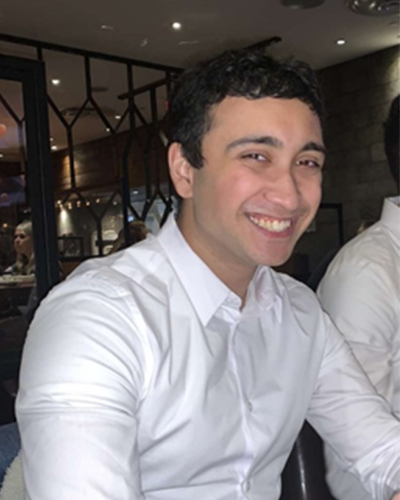Student Spotlight: Rafeh Shahid
Global Undergraduate Awards 2023 Winner
Regional Winner: Medical Sciences

The Global Undergraduate Awards recently announced the winning submissions for 2023, which include the following from Western: three Global Winners, three Regional Winners and 23 Highly Commended.
Meet Rafeh Shahid, Regional Winner (best submission in the US and Canada) in the category of Medical Sciences:- Student in Medical Sciences
(honours specialization in physiology and pharmacology) - Current Research Assistant working with Professor Adrian Owen
- Submission title: Investigating the effects of systemic physiology on Functional Near-Infrared Spectroscopy based resting-state functional connectivity networks
Can you provide a short summary of your research?
We looked at resting state functional connectivity and the brain's connectivity at rest, which is a biomarker of brain function with the potential to be used as a diagnostic and monitoring tool for patients with several different brain disorders.
In our study, we used a neuroimaging technique called functional near infrared spectroscopy, otherwise known as fNIRS, to assess resting state functional connectivity in the brain. By performing a number of tests on patients, we determined that contamination increases false positives in tests. Removal of systemic physiological noise produces more localized and stable functional networks, making fNIRS a more reliable and clinically useful tool for investigating brain function in neurological and psychiatric conditions.
In the larger scheme of things, research like this will ultimately help us to achieve the bigger goal of trying to determine whether or not people in comas are conscious and how likely they are to recover from the coma.
What do you hope the impact will be? What is your motivation for pursuing this research?
I’ve always been interested in health care and medicine, but when I began working on this project with Adrian Owen, I realized research like this could allow families and caregivers of patients with traumatic brain injuries to make a more informed decision about how to proceed.
With the medical advances we have now, we can often keep people alive using machines and it’s actually very difficult for people to physically die in hospital. We have respirators that can take the job of your lungs, we have machines that can pump blood through your heart, we have machines that can filter your blood and take the job of your kidneys. Often families of patients with brain injuries don’t know how likely their loved ones are to recover. They don’t know how much damage has been done to their brain and what their recovery would be like. We want to get more information to allow families to make a more informed decision in the intensive care unit at such a critical time, so they can make the right decision for them.
On a personal level, being part of this study also made me realize that there's than one way to make an impact. If I become a physician, it's kind of helping one person at a time. But, if I become a researcher, it's more possible to create widespread impact. If you can discover even one thing in your lifetime, you may be able to help millions and millions of people.
What do you hope to do in the future?
Right now, I'm applying to medical schools but I'm also going to be applying to graduate research programs. I’m also considering doing an MD/PhD, or something where I can incorporate both. I know where I'm going, I just don't know which door I’ll take yet.
> Read more about Western students honoured by The Global Undergraduate Awards

